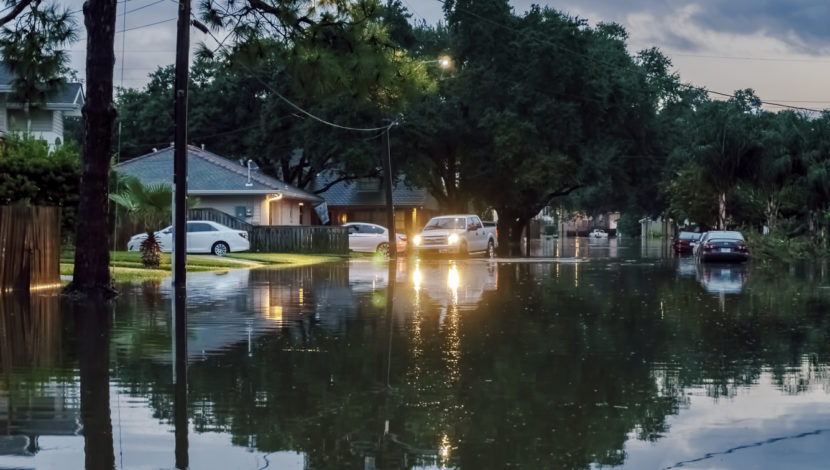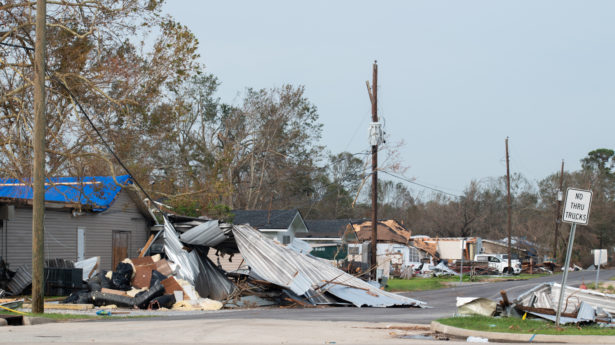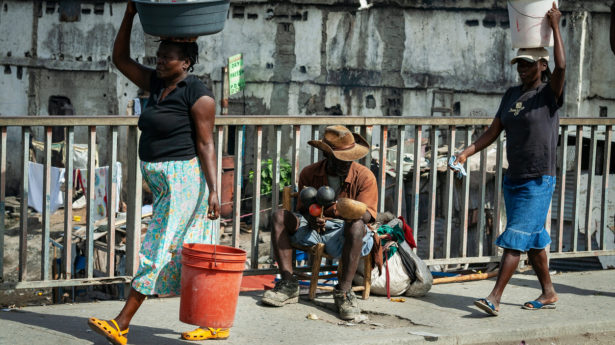The Unitarian Universalist Service Committee advances human rights through grassroots collaborations.
Hurricane Ida: A Disaster Long in the Making

By on September 1, 2021
Sixteen years to the day since Hurricane Katrina made landfall, southeastern Louisiana is once again in the crosshairs of a climate-related disaster. The massive Category 4 Hurricane Ida barrelled into the state’s southeastern bayou region on Sunday, August 29, bringing life-threatening floods, power loss, and severe wind damage in its wake.
UUSC’s long-standing partners in rural Louisiana live and work directly in the storm’s path. They knew disasters like this were possible, and they have charted a course for how to respond. Here’s what we know so far about Hurricane Ida’s impact on their communities:
Hurricanes like Ida are a manifestation of the climate crisis and accelerate climate displacement. They demand more robust support for community-led adaptation, mitigation, and relocation in the face of climate risks.
Our Louisiana-based partners have long warned about the potential impacts of hurricane-strength storms. They also know that, as the planet continues to warm due to the burning of fossil fuels, storms like Ida are going to become more frequent and severe. Because of this, they have called for more robust federal support for community-led efforts to respond to climate-forced displacement. They are also reminding us that our attention should not be short-lived during disaster seasons, when the impacts of these storms are still fresh on the news media’s mind; instead, we must remain focused on addressing the ongoing crisis at hand.
Existing state and federal interventions have not been sufficient to shield our partners’ communities from the worst of the storm’s impacts.
While Louisiana’s multibillion-dollar investment in new levees and pumps has reportedly spared New Orleans from the catastrophic flooding it witnessed after Hurricane Katrina, many of the places where our partners live were excluded from the state’s flood protection system. As a result, cities like Houma and Grand Isle have faced more severe storm impacts from Hurricane Ida. And even in areas covered by the new flood protection infrastructure, such as the city of New Orleans, indefinite power outages and severe wind damage pose grave risks.
Disasters like Ida are layered on top of pre-existing structural injustices.
Communities in the northern areas of Lake Charles, Louisiana have still not recovered from last year’s devastating Category 4 storm, Hurricane Laura. Structural barriers to federal aid have meant that basic needs in the wake of the storm are going unmet, and federal assistance dollars have not been adequate to meet the needs of people directly impacted. Meanwhile, many low-wealth Black, Indigenous, and People of Color (BIPOC) communities in the state face heightened risk of cancer and other health problems due to the siting of petrochemical facilities and other polluting industries in their communities.
These forms of environmental racism show the need to view storms like Ida through the lens of disaster justice. It is not hurricanes or other natural hazards alone that turn challenges into disasters. Rather, disasters stem from the failure of those in power to adequately prepare for and distribute resources to address the risks that natural hazards pose.
That is why UUSC and our partners are working long-term in the southern-coasts of Louisiana, not only to address immediate human needs in the wake of storms like Ida and Laura, but also to remove the systemic barriers that prevent communities from accessing the preparedness and recovery assistance to which they all have a right, just like everyone else.
Our partners plan ahead; they must be at the head—and center—of future disaster preparedness and recovery efforts.
Just weeks before Hurricane Ida struck the state, our partners at the Lowlander Center reached out with an urgent request from communities in the Lake Charles region. They recognized that, as another hurricane season approached, and as people in the area still struggled from the impacts of last year’s Hurricane Laura, they needed to pre-position disaster relief resources in the event of another major storm.
UUSC provided a $30,000 grant to Lowlander to support these efforts, and we know that more is needed. It is clear now that the assistance could not come too soon. Before the month was over, our partners’ warnings were fulfilled; another major climate-related disaster had struck the state. The lesson is clear: The people on the front lines of climate impacts know the problems they face better than anyone. They must be in the lead of articulating their own communities’ needs and responding in times of crisis.
You can help UUSC respond to Hurricane Ida in ways that center community leadership:
- Help us support community-led disaster preparedness and recovery efforts in Louisiana by contributing to UUSC’s emergency relief fund and supporting our partners the Lowlander Center. This allows us to get resources to people on the front lines of the disaster working to ensure an equitable recovery.
- Learn more about the framework of disaster justice and how it guides UUSC’s work. See also our related work on climate justice.
- Take action by sending a message to your members of Congress. Urge them to respond to the emerging global challenge of climate-forced displacement in ways that uphold human rights.
***
About UUSC: Guided by the belief that all people have inherent worth and dignity, UUSC advances human rights globally by partnering with affected communities who are confronting injustice, mobilizing to challenge oppressive systems, and inspiring and sustaining spiritually grounded activism for justice. We invite you to join us in this journey toward realizing a better future!
Image Credit: iStock – sfe-co2

